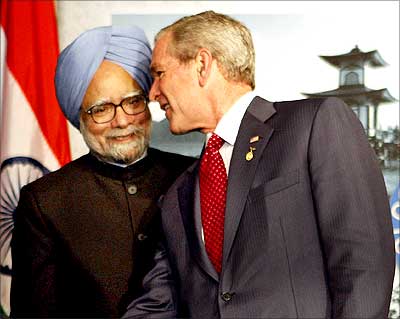|
| Help | |
| You are here: Rediff Home » India » News » First Look |
|
 Twice in one week, outgoing US President George Bush [Images] held up
Twice in one week, outgoing US President George Bush [Images] held up
Halfway through the last full week of his presidency, already George W Bush [Images] has twice pointed to improved Indo-US ties as one of his great foreign policy achievements.
On Monday, asked if perceptions of the US had declined worldwide, Bush called on Indians for support. "Go to India, and ask about...their view of America," he had said emphatically, his position bolstered by a 2007 Pew Poll of public opinion that found roughly 2/3rds of Indians thought favourably of the US president.
Then, on Thursday, Bush told members of the US Department of State that under his presidency, America had opened a "new historic and strategic partnership" with India.
He wasn't just blowing hot air, either. Though his overall foreign policy track record is riddled with failures and missteps, there's no doubt that the president's handling of India has been an overwhelming success.
Barring a few issues of contention and consternation, at the moment India and America are clear allies: they share information and co-operate on issues of international security (counter-terrorism, Somali pirates), their armed forces routinely engage in joint training exercises, Americans companies invest heavily into Indian industry (and vice versa, to a lesser extent) and trade -- economic, cultural, intellectual, etc -- between the two nations is at an all-time high.
And, of course, the high water mark of US-Indo relations was reached in the recently agreed upon Indo-US civilian nuclear agreement, which Bush fought for with every ounce of his waning political capital.
In hindsight, what President Bush and Indian Prime Minister Manmohan Singh [Images] achieved with regards to the nuclear deal is nothing short of remarkable. Almost solely on their will alone, the bill traversed a treacherous and stormy passage through India's Parliament, where it forced a trust vote that narrowly upheld the United Progressive Alliance government, through international bodies like the Nuclear Suppliers Group, which eventually agreed to make sweeping exceptions for India, to finally the US Congress, where many wary isolationists tried and failed to shoot it down. Bush formally signed the bill into law on October 8, 2008, and with it achieved one of the great victories of his eight-year tenure.
In September, on his final visit to the US, Prime Minister Singh showed his genuine appreciation for President Bush's efforts to bring the two nations closer. "Thank you very much. The people of India deeply love you," PM Singh said. He wasn't being facetious.
Because, eight years ago, when Bush entered the White House, he inherited an Indo-US relationship far different from the one we see today. Though, in the abstract, India and the US should have been close friends -- since both countries were ethnically diverse multi-religious democracies � geopolitical considerations had left Washington DC-New Delhi [Images] ties strained.
US President Bill Clinton [Images] attempted to thaw Indo-US ties, but only in the latter half of his presidency, and never with the gusto that Bush has demonstrated. That's because, presciently, Bush foresaw the rise of India and China as two major world players, and worked to ensure good relations with both.
As India finalised its steps to open up the economy for investing and trade, Bush cleared the way for US companies to set up shop in India. The rise of India's IT and BPO industries -- which today are synonymous with India the world over -- owes a great deal to the policies pursued by George W Bush.
He's also been a great friend of the Indian American community in the US, which has seen its influence and visibility grow to unprecedented heights during his tenure.
Yet, for all his hard work, Bush failed on one crucial keystone of any future successful US-Indo alliance: Pakistan. Admittedly, he was in a tough spot, not wanting to make a bad situation irretrievably so. But unequivocally supporting the likes of Pakistani Army Chief Pervez Musharraf [Images] was viewed by Indians with scepticism and contempt.
Add to that, America's duplicitous practice of selling arms to both countries does not go unnoticed in India. Nor do the continued claims that Pakistan is a 'key ally' in the 'War on Terror', which seem highly contradictory when India repeatedly suffers terrorist attacks that originate from within Pakistan, most recently in Mumbai [Images].
Still, in the balance, it's Indians like author Arundhati Roy who shower Bush with invectives and criticism, not political moderates. And though his 'War on Terror' has been massively unpopular around the globe, Indians, being victims of terror, are more sympathetic to it than most.
If US President-Elect Barack Obama [Images] can continue Bush's efforts to bring together the world's two most populous democracies, the 21st century could really and truly an age of great India and USA partnership. But to do this, he'll need to tackle the one issue that Bush has badly bungled: ensuring peace, stability and democracy in Pakistan.
How he'll do that is anyone's guess.
Image: Prime Minister Manmohan Singh and US President George Bush share a laugh during the G8 summit in Tokyo in July 2009. Photograph: Jim Young/Reuters
Matthew Schneeberger is an American reporter working in rediff.com's editorial headquarters in Mumbai
Previously in the series:
Inauspicious beginning, inglorious end
After 9/11, Bush suddenly had political capital
Alas, 9/11 led to Bush's cowboy foreign policy
A war without cause, without end
Perhaps history will be kinder to Bush
| Email | Print | Get latest news on your desktop |
|
|
| © 2009 Rediff.com India Limited. All Rights Reserved. Disclaimer | Feedback |